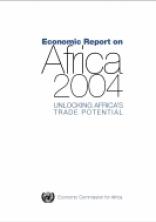Economic Report on Africa 2004

After fifty years progress, the future of the multilateral system of trade negotiations is surrounded by uncertainty. Th e collapse of the Cancun World Trade Organization (WTO) Ministerial Meeting in 2003 has put pressure on the Organization of Economic Co-operation and Development (OECD) countries to reduce agricultural subsidies and other domestic support measures that distort global trade and contribute to the marginalization of Africa in the international trading system.
The Economic Report on Africa (ERA) 2004 takes the view that OECD trade policies are a serious constraint to Africa’s integration into the global economy. African exports have been handicapped by industrial country policies such as tariff escalation, tariff peaks and agricultural protectionism. Th e industrialized countries must commit themselves to the development principles of the WTO’s Doha Round, by widening market access for developing country exports and providing more trade-related assistance to poor countries. Such assistance is necessary, both to bear the heavy costs associated with trade liberalization and to help countries exploit the opportunities arising from a more integrated global economy.
But the Report also argues that strengthening Africa’s supply side capacity is essential to more successful integration into the global economy. Weak infrastructure, poor trade facilitation services, and inadequate physical and human capital are impediments to the development of Africa’s export sectors. ERA 2004 takes an introspective look at what Africa needs to do to put its house in order so as to benefi t from existing and future opportunities in the global trading system.